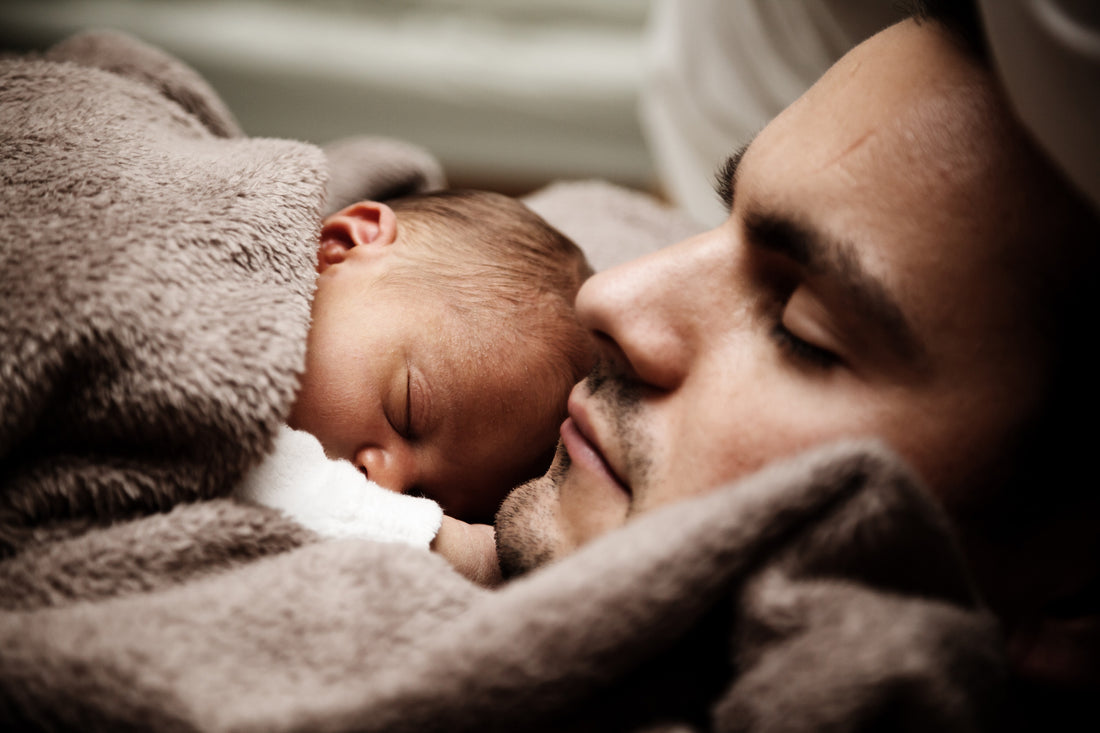
The perfect sleep routine for a restful night: sleep training
Share
The first days with a newborn at home are a unique mix of joy and question marks. This article offers a comprehensive guide to creating sleep habits that promote not only the baby's well-being but also the peace of mind of the parents.
As a new mom or dad, you probably know that uninterrupted sleep with a baby is often in short supply. This is completely normal, as around 75% of babies have irregular sleep in their first few months.
But don't worry, there is a way to shorten your baby's waking periods and help him sleep longer at night: sleep training. This simple and safe process lays the foundation for restful nights and healthy development.
In the first few weeks, babies do not differentiate between day and night. It is important to introduce small routines to encourage the day-night rhythm. Two key elements that have proven effective are the daytime and evening routine.
The daily routine begins in the morning with a warm "Good morning sunshine". Turning on the light, changing diapers, caring for the baby and being conscious of the sleep phases during the day help to establish a regular daily rhythm.
The evening routine is designed to create a calm atmosphere. Darkening the room, whispering quietly, changing the diaper and offering a drink from the breast or from the bottle are crucial routines before going to bed.
Why is sleep training necessary?
Well-rested babies are not only happier, but also healthier. Sleep promotes brain and body growth, supports mood, and improves cognitive abilities. Sleep training involves several factors that work together to promote healthy sleep habits:
Mood: Studies – and life experience – show that babies who have had a good night’s sleep are more balanced. They are happier and less moody than overtired babies.
Weight: Sleeping helps your baby grow. This means they will gain weight faster, which not only makes them healthier overall, but also helps them sleep longer at night.
Brain development: Studies show that babies who sleep well have improved cognitive abilities, including memory retention (storing, reproducing and recognizing experiences).
You're better rested: Well-rested babies make well-rested parents, which in turn makes you healthier, happier, and a better parent - it's true, studies show that parents or caregivers who sleep well are more alert and attentive.
When do I start sleep training?
The foundations can be laid at birth, but proper sleep training should not begin until 3-4 months, when your baby weighs at least 6 kg and the pediatrician gives the green light.
The Basics of Sleep Training
Wakefulness: How long your baby is awake is just as important as how long he or she sleeps. Observing the wakefulness intervals or wakefulness windows will let you know when to look for tiredness signals.
Sleepiness signals: These are possible signs that your baby is tired: yawning, rubbing eyes, laying head down, not wanting to play anymore, looking away when contacted, or being whiny. When you see these signs, your baby's wakefulness window is closing and it's time to move on to your bedtime routine.
Consistent bedtime rituals: A repetitive, soothing bedtime routine helps provide security and confidence to your baby before bedtime and teaches him when it's time to sleep. Shorter versions can also be done before daytime naps. These structured events are crucial to helping your baby learn healthy sleep habits.
Sleep-promoting environment: One thing you can do from the day you bring your baby home from the hospital is to create an ideal sleep environment that is dark, quiet and temperature-controlled. This can be achieved by:
- Speakers: Playing white noise helps lull a baby to sleep and block out outside noise.
- Music: Singing a lullaby or playing familiar, calming music can help. Some children find a quiet environment helps them fall asleep, while others prefer background noises, such as the familiar clatter of dishes when washing up or voices.
- Perfect temperature: Babies – and adults – sleep best in rooms with 20-22 degrees Celsius.
- Calming scents: Lavender, jasmine and chamomile are great options for creating a relaxing, calming environment.
- Object: A cuddly toy or a blanket that smells familiar can provide security.
- Physical contact: Direct physical contact signals to the baby “you are not alone, I am here”
Document your baby's sleep: Your baby's sleep cycles and patterns change as they age. By tracking when they wake up, sleep, and go to bed at night, you'll gradually learn more about your baby's rhythm and be able to better support them in getting to sleep at their usual times.
When is it too late for sleep training?
It's never too late to start sleep training. The sooner the better, but it can also be successful later.
Naps during the day?
Naps are just as important as nighttime sleep. Watch for sleepiness cues and keep the waking time before naps in daylight with natural light. Watch for sleepiness cues: Sleepiness cues also occur before naps, so watch for them around 20-30 minutes before bedtime to gauge when your baby is ready to go to sleep. Don't worry, you'll quickly learn to recognize your baby's natural sleepiness cues.
How much should my baby sleep?
Although every baby is unique and has their own sleep pattern, there are some general guidelines.
The recommended amount of sleep for newborns (0-3 months) is 14-17 hours in 24 hours, although it can be as little as 11 or as many as 19 hours.
Note that your baby's sleep will be very disorganized at first. He doesn't yet understand the difference between day and night and needs to be fed often. Typically, he will sleep for 2-3 hours before waking up for a meal, change or cuddle, and then falling back asleep about 30-45 minutes later.
4-11 months: Babies at this age typically sleep 12-15 hours a day, although it can be 10-18 hours.
12+ months: By one year, most babies sleep 11-14 hours a day, including 1-2 hour naps. Sometimes it can be 9 hours or up to 16 hours.
Conclusion:
The various aspects of baby sleep and sleep training can be challenging for parents, but with understanding, patience and a child-tailored approach, positive sleep habits can be established. Creating a safe, comfortable sleep environment and incorporating calming rituals will help ensure that both baby and parents get restful sleep. After all, a rested baby also means rest and relaxation for the whole family.
Sources:
https://www.pampers.com/en-us/baby/sleep/article/baby-sleep-training
